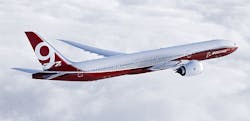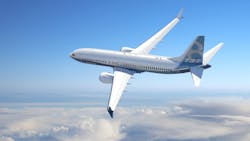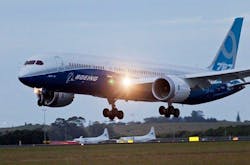Boeing logs airliner and freighter orders, unveils performance enhancements, expands supply chain
FARNBOROUGH, England, 14 July 2016. Boeing officials continue to reveal technology advances, supply chain expansion, and aircraft orders – including 777 jet airliner performance enhancements, a U.A.E.-based supply chain partner for composites, and both commercial and military contracts – during Farnborough International Airshow in England this week.
Boeing [NYSE:BA] and Qatar Airways are launching a new Performance Improvement Package. Qatar Airways, the first customer to take advantage of the new modification offering, will be upgrading its entire fleet of 53 777s.
"Qatar Airways operates one of the world's youngest and most technologically advanced fleets, and we are always seeking ways to grow our operational advantage," says Qatar Airways Group Chief Executive Akbar Al Baker. "We appreciate Boeing's continued efforts to improve the value and efficiency of our existing airplanes, allowing us to stand out in the marketplace and keep our fleet at the forefront of global aircraft performance capabilities."
Through design improvements, Boeing's retrofittable Performance Improvement Package enables airlines to open new routes, fly existing routes more efficiently, and improve both payload capacity and range.
"Boeing never stops evaluating means of improving our already highly efficient and reliable aircraft," adds Stan Deal, senior vice president, Boeing Commercial Aviation Services. "With our Performance Improvement Package, we're helping our customers obtain even greater performance from the market leading 777 family of aircraft."
Doha-based Qatar Airways currently operates a fleet of 34 Boeing 777-300ERs and nine 777-200LRs, in addition to 10 777 Freighters, linking over 150 international destinations across the globe.
Boeing is now sourcing carbon fiber pre-impregnated (prepreg) composite material for the Boeing 777X from a new joint venture formed by Mubadala Development Company and Solvay. Boeing is the first customer for the Mubadala-Solvay joint venture, which will produce primary structure composite material for use in manufacturing the 777X empennage and floor beams. Mubadala and Solvay are planning for the joint venture to be operational by 2021 in a new facility built in Al Ain, U.A.E.
"Our commitment to purchase this prepreg material for the 777X meets several important goals for Boeing, from further advancing aerospace industry development in the U.A.E. to expanding high-quality materials in our supply chain," says Boeing Commercial Airplanes President and CEO Ray Conner.
"Together with Solvay, we will further develop our capabilities in advanced composite materials production in order to expand the supply chain and create a materials ecosystem. The creation of a new manufacturing facility at the Nibras Al Ain Aerospace Park supports our efforts of delivering on Abu Dhabi's Economic Vision 2030 by developing a regional Aerospace Hub for Abu Dhabi," explains Homaid Al Shimmari, CEO of Aerospace & Engineering Services, Mubadala.
Prepreg composites, a combination of high-strength carbon fiber and toughened epoxy resin, reduce weight to improve fuel efficiency in aircraft. The Boeing 777 was the first commercial airplane to contain structurally significant composite parts. Composites account for 50 percent of structural weight of the 787 Dreamliner, and the 777X will have the world's largest composite wing. Production of the 777X will begin in 2017, with its first delivery in 2020.
Boeing is also providing six customers with advanced analytics solutions, designed to help customers increase efficiency and drive down the costs of operating more than 500 airplanes. Boeing’s analytics tools are intended to “empower airlines to make better decisions and significantly improve performance on the ground and in the air,” officials say.
Agreements include:
All Nippon Airways (ANA) signed a renewal contract for Airplane Health Management (AHM) on its entire future fleet of Boeing 787 aircraft. ANA uses AHM tools to monitor their aircraft in real time and proactively manage maintenance operations more efficiently.
British Airways signed a contract for Wind Updates, currently installed on 88 airplanes with plans for additional fleet integration. Customers of Wind Updates typically average a savings of 200-400 lbs. (90-180 kg.) of fuel per flight by leveraging real-time information about atmospheric conditions to improve performance.
Delta Air Lines signed an agreement to use Airplane Health Management (AHM) on its Boeing 737, 747, 767, and 777 fleets. Delta uses AHM's analytics-based predictive alerts to reduce delays and cancellations by scheduling maintenance in a controlled manner, to avoid schedule disruptions.
GOL signed an agreement to use the Engine Fleet Planning and Costing (EFPAC) tool, which significantly reduces operating costs by determining specific engine management practices over the life span and enabling better decision making.
Pobeda Airlines signed a contract to deploy Fuel Dashboard services across its fleet of Boeing 737s. Fuel Dashboard helps airlines reduce fuel consumption 2-7 percent annually.
Yangtze River Express signed a contract to use Maintenance Performance Toolbox Records with its fleet of airplanes. Yangtze River Express is the first customer in China to integrate the Toolbox Records service, which eliminates the operational challenge of managing paper-based maintenance records.
Boeing and Volga-Dnepr Group finalized terms for the acquisition of 20 Boeing 747-8 Freighters, including four aircraft that have already been delivered. Boeing also signed an agreement with the Group's subsidiaries AirBridgeCargo Airlines and Volga-Dnepr Airlines to provide long-term logistics support for Boeing Commercial Airplanes and its partners using Boeing 747-8 and Antonov 124-100 freighters. Boeing and Volga-Dnepr Group will also enter into an agreement to look at future services opportunities.
The newly-delivered 747-8 Freighter on display in the Cargo Village at Farnborough will be operated by CargoLogicAir, the new British cargo airline and partner of Volga-Dnepr Group.
Volga-Dnepr is one of the leading carriers of aerospace cargo, working with aircraft manufacturers and operators, helicopter manufacturers and operators, satellite companies, and aircraft parts manufacturers. The Group generates over 30 percent of its revenues from the delivery of aerospace cargo, having completed more than 5,150 flights for aerospace customers and carried nearly 170,000 tonnes of products.
Boeing and Xiamen Airlines signed a Memorandum of Understanding (MOU) for the purchase of up to 30 Boeing 737 MAX 200 airplanes, valued at up to $3.39 billion at current list prices. Airline officials see the MAX 200 as a fit for its low-cost subsidiaries, including Jiangxi Airlines and Hebei Airlines. Both parties will work closely to finalize the agreement, which requires the approval of Xiamen Airlines board and the China Southern Airline Group board, as well as the Chinese Government.
Xiamen Airlines currently operates an all-Boeing fleet of more than 140 airplanes including six 787 Dreamliners, 130 Next-Generation 737s, and four 757s. The carrier plans to grow its operational fleet to 200 airplanes by the end of the decade and looks to expand regionally with the new 737 MAX. Xiamen-based Xiamen Airlines is a stated-owned subsidiary of China Southern Airlines.
Donghai Airlines officials intend to purchase 25 Boeing 737 MAX 8 aircraft and five 787-9 Dreamliner commercial airliners, valued at more than $4 billion at current list prices.
Shenzhen-based Donghai Airlines previously ordered 15 Next-Generation 737-800s and 10 737 MAX 8s in 2013.
"Donghai Airlines has undergone steady development over the past 10 years since the beginning of our freighter operations in 2006," explains Donghai Airlines Chairman Wong Cho-Bau. "Under China's One Belt One Road initiative, we will accelerate our fleet expansion plan to satisfy the rapidly growing air travel market and help build our home base Shenzhen as the transportation hub in southern China."
The 737 MAX incorporates CFM International LEAP-1B engines, Advanced Technology winglets, and other improvements to deliver the highest efficiency, reliability and passenger comfort in the single-aisle market.
The 787-9 Dreamliner can fly 290 passengers up to 14,140 kilometers in a typical two-class configuration. The airplane will deliver unmatched fuel efficiency to Donghai airlines, enabling the carrier to expand the range and quantity of services on long-haul market.
Standard Chartered Bank has ordered 10 Next-Generation 737-800 aircraft. The order is valued at $960 million at current list prices. “We are investing to leverage our global and leasing capabilities to demonstrate our commitment to key clients by providing aircraft on operating lease to meet increasing air traffic demand across some of the world's fastest growing regions. With deliveries through 2018, these new Boeing Next-Generation 737-800s will help us meet near-term client demand and expand our client base in our core markets, such as North East Asia," says Kieran Corr, head of Aviation Finance at Standard Chartered.
With an average age of less than five years, Standard Chartered's fleet comprises some of the most modern and fuel efficient aircraft in the market. "Our key markets are Asia, Africa and the Middle East, with a focus on emerging markets," adds Corr. "We want to help the aviation sector grow in those markets to drive regional trade and investment and we can only do that with an expanded diversified fleet."
EGYPTAIR has ordered nine Next-Generation 737-800s, valued at $864 million at current list prices.
Eight of the airplanes will be financed by Dubai Aerospace Enterprise, headquartered in Dubai, United Arab Emirates. The announcement coincides with 50 years of partnership between Boeing and the airline that began with an order for a 707 in 1966. EGYPTAIR placed its first 737 order in 1975.
"Over the years, Boeing has played an important role in our growth plan," explains Safwat Musallam, chairman and CEO, EGYPTAIR Holding Company. "The Next-Generation 737-800s have earned an excellent reputation for reliability, performance and cost efficiency and has added tremendous value to our operations. The addition of several more of this airplane will definitely enable us to continue with our plans to introduce modern, efficient aircraft on our short to medium haul destination network."
EGYPTAIR currently operates 20 737-800NGs and when the nine airplanes on order have been delivered will comprise the largest single-aisle aircraft type in its fleet. The airline has six 777-300ERs and two 777-200ERs. EGYPTAIR forecast significant growth of their total fleet by 2026.
Boeing announced 10 new orders and commitments for its Boeing Converted Freighters (BCF) program. Cargo Air, based in Sofia, Bulgaria, and Lineas Aereas Suramericanas (LAS) Cargo, based in Bogota, Colombia, will each receive two 737-800BCFs. Air Algerie, based in Algiers, Algeria, signed a commitment for two 737-800BCFs. An unidentified customer ordered four 767BCFs.
"We have received very positive response from the market for Boeing's 737-800 and 767 freighter conversion programs," says Rick Anderson, vice president of sales and marketing, Boeing Commercial Aviation Services. "As our customers expand their freighter services and seek to improve fleet efficiencies, they are coming to Boeing for their freighter needs because of the quality and value we provide."
Boeing's freighter conversion programs transition passenger airplanes into freighters, extending the economic life of the airplane.
Boeing has won 22 firm orders for the 767BCF and up to 59 orders and commitments from customers around the globe for the 737-800BCF. Both models meet the demand for freighters to support the express cargo market.
Boeing launched the 737-800BCF program in February in response to this demand. Airplanes will be modified into freighters at select facilities located near conversion demand, including Boeing Shanghai Aviation Services. The first 737-800BCF is expected to deliver in the fourth quarter of 2017.
Officials at tourism business TUI Group have finalized an order for 10 Boeing 737 MAX 8s and one 787-9 Dreamliner. The order, valued at $1.4 billion at current list prices, includes an option for one additional 787-9.
With today's order, TUI Group now has three unfilled orders for 787-9s and 70 for the 737 MAX.
TUI Group last year announced its five-year sustainability strategy, 'Better Holidays Better World 2015-2020,' built around three core pillars to help shape the future of sustainable tourism. As one pillar, TUI aims to operate Europe's most carbon efficient airlines and reduce the carbon intensity of its operations by a further 10% by 2020.
"The addition of 787-9s to its fleet will provide TUI Group with greater flexibility across its route network, while the 737 MAX will ensure it remains at the forefront of the European leisure market," says Boeing Commercial Airplanes President and CEO Ray Conner.
Additionally, TUI Group has selected GoldCare Component Services for its Next-Generation 737 and 737 MAX fleet. It will be the launch customer for Boeing's 737 MAX Component Services program. Boeing has provided 737 Component Services for Thomson Airways and Jetairfly, members of the TUI Group, since September 2007.
There are six proprietary airlines in the TUI Group operating 136 medium and long-haul aircraft, including more than 100 Next-Generation 737s and 14 787s. These airlines are TUIfly, Thomson, TUIfly Nordic, Jetairfly, Corsair, and TUIfly Netherlands, serving more than 180 destinations around the world.
Boeing has received a commitment for 30 Boeing 737 airplanes from an unidentified Chinese customer at the 2016 Farnborough Airshow. The commitment includes a mix of 737 MAX and Next-Generation 737 airplanes, valued at more than $3 billion at current list prices.
Search the Aerospace & Defense Buyer's Guide
You might also like:
Subscribe today to receive all the latest aerospace technology and engineering news, delivered directly to your e-mail inbox twice a week (Tuesdays and Thursdays). Sign upfor your free subscription to the Intelligent Inbox e-newsletter at http://www.intelligent-aerospace.com/subscribe.html.
Connect with Intelligent Aerospace on social media: Twitter (@IntelligentAero), LinkedIn,Google+, and Instagram.
Intelligent Aerospace
Global Aerospace Technology NetworkIntelligent Aerospace, the global aerospace technology network, reports on the latest tools, technologies, and trends of vital importance to aerospace professionals involved in air traffic control, airport operations, satellites and space, and commercial and military avionics on fixed-wing, rotor-wing, and unmanned aircraft throughout the world.







